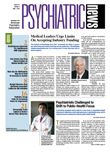The Food and Drug Administration (FDA) has approved escitalopram, an antidepressant marketed by Forest Laboratories, for the acute and maintenance treatment of major depressive disorder in adolescents aged 12 to 17.
The March 20 approval came less than a month after the U.S. Attorneys Office for the Massachusetts district filed a federal civil suit accusing Forest of having illegally marketed escitalopram and citalopram for off-label use in children and adolescents from 1998 to 2005 (Psychiatric News, April 3). The suit also alleges that Forest knowingly suppressed unfavorable facts about citalopram from the medical community and the public, including the lack of efficacy in one trial and the increase in suicidality reported by pediatric patients.
Citalopram is a racemic mixture of R- and S- isomers of the molecule, while escitalopram contains only the S- isomer, the active component of the mixture.
According to an announcement by Forest, the FDA's decision to approve escitalopram for treating adolescent depression was based on two randomized, placebo-controlled trials. In one trial, the greater efficacy of escitalopram 10 mg to 20 mg daily compared with placebo was statistically significant after eight weeks of treatment in patients aged 12 to 17 with major depressive disorder. The efficacy endpoint was measured by improvement in the Children's Depression Rating Scale-Revised (CDRS-R) scores.
The second trial supporting the approval was an earlier trial conducted on citalopram. In that study patients aged 7 to 17 treated with 20 mg to 40 mg daily of citalopram improved statistically significantly more than subjects taking placebo. The improvement was also measured by CDRS-R scores. These positive efficacy data “largely came from the adolescent subgroup,” according to the company.
However, two other placebo-controlled trials, one of each conducted on citalopram and escitalopram, had failed to demonstrate significant benefits of either drug over placebo, the company acknowledged. One trial tested escitalopram in patients aged 7 to 17; the other tested citalopram in adolescents.
“Escitalopram is the only active enantiomer of the racemic drug citalopram, so we considered it reasonable to [deem] the positive citalopram study along with the positive escitalopram study as sufficient evidence ... to support the approval,” Karen Mahoney, an FDA spokesperson, told Psychiatric News.
None of these clinical trials studied the long-term efficacy and safety of citalopram or escitalopram. Nevertheless, the FDA approved escitalopram for maintenance treatment because the efficacy in adolescents “can be extrapolated from adult data” and from the drug's pharmacokinetic parameters, according to Forest's announcement.
In 2002, the FDA turned down the company's application for the use of citalopram in child and adolescent depression based on the two clinical trials conducted on the medication, one with positive efficacy results and one with negative efficacy results. The patent on citalopram expired in 2003.
Before the recent escitalopram approval, fluoxetine was the only SSRI approved for use in patients younger than age 18. Currently, all antidepressants carry a black-box warning in their prescribing information about their propensity for increasing the risk of suicidal thoughts and behaviors in patients under age 25.
In the federal lawsuit, prosecutors said that Forest aggressively promoted the positive results of the single successful trial in citalopram and concealed the negative trial from health care professionals and the public. They also alleged that the company had used kickbacks, gifts, and other illegal means to persuade or induce physicians to prescribe both drugs for child and adolescent patients. Because neither drug was approved for pediatric use at the time, the manufacturer was prohibited by law to promote off-label use. Despite the recent FDA action, the lawsuit against Forest remains active.
The FDA-approved label for escitalopram is posted at<www.fda.gov/cder/foi/label/2009/021323s030s031,021365s021s022lbl.pdf>.▪
